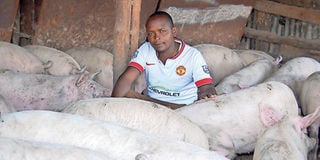For quality pigs, I make own feeds

Anthony Kamau inside on of the pigsties in his farm in Nakuru, where he keeps up to 70 pigs. PHOTO | FRANCIS MUREITHI | NMG
What you need to know:
- While he acknowledges that he went into pig farming after failing to secure a formal job, he notes that keeping the animals remains his best decision.
- Kamau owns a mixer that he uses to make feeds, cutting production by 30 percent.
- Kamau says he castrates his boars due to space limitation. “I prefer buying young pigs, rear and sell them when they are ready for the market.
Anthony Kamau is feeding his pigs that he rears on his eighth-acre piece of land in London estate, Nakuru town, when Seeds of Gold team meets him
Dressed in a white T-shirt, a brown trouser and a matching pair of gumboots, the farmer starts with the task every morning before leaving the farm to open his pork outlet at Maili Sita centre on the Nakuru-Nyahururu Road.
Kamau was introduced to pig farming some eight years ago by his mother, starting with three piglets.
Today, Kamau, 34, does not only keep 70 animals but he also runs the pork outlet.
“My challenge now is space but I could be keeping over 100 animals,” says the electrical engineering graduate from Technical University.
While he acknowledges that he went into pig farming after failing to secure a formal job, he notes that keeping the animals remains his best decision.
“I wish I started this project earlier because I lost plenty of time searching for a job,” he explains, adding his biggest headache currently is getting people to employ to take care of his animals.
The challenge has seen him come up with a one-week feeding formula.
“I have made several troughs where I place the feeds that I make myself for the animals to consume for a week giving me time to sell pork at the butchery.”
Each of his pigs consumes about 2kg of feeds, which translates to 140kg of feeds per day.
DISEASES' SPREAD
A 70kg bag of pig feeds goes for Sh2,400 at most agrovet outlets in Nakuru town.
“The challenge with the commercial feeds is that some of them are not of high quality, which makes growth of pigs vary. When I make my own feeds, I save Sh600 per bag.”
Kamau owns a mixer that he uses to make feeds, cutting production by 30 percent.
“I mix 50kg of maize germ with 45kg of wheat bran and 15kg of soya and lysine and Digestible Crude Protein (DCP).
I also add 200g of salt to make about 190kg of feeds at a cost of Sh1,800 per 70kg bag,” he says, adding he learnt the skills from fellow farmers.
Kamau says he castrates his boars due to space limitation. “I prefer buying young pigs, rear and sell them when they are ready for the market. Breeding takes longer, thus, if I buy the animals, I sell mature pigs up to four times a year.”
Piglets, says Kamau, should have their sharp teeth clipped three days after they are born to prevent them from injuring their mothers during suckling.
To protect his animals from infections, he deworms them at least every three months and he does not allow outsiders to step into the feeding area.
“Visitors spread diseases like the African swine fever. They must disinfect their footwear.”
He sells a pig weighing 55kg at Sh15,000. “In a good month, I sell more than six pigs which translates to good income,” he says, adding a kilo of pork goes for Sh400.




